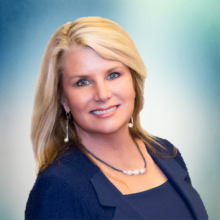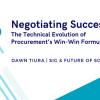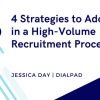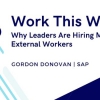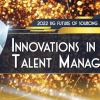Dawn Tiura: Folks, I'm excited for this next podcast. It's with Colleen. And Colleen Tiner is with Beeline. Beeline is a finalist in our Talent category with the Beeline Self-Sourcing Project. Welcome to the podcast.
Colleen Tiner: Thank you, Dawn.
Dawn Tiura: We're excited to have you. So when you first went out to create the Self-Sourcing Project, what were you trying to solve? What got you to this innovation?
Colleen Tiner: Great question. We started investigating this concept of self-sourcing back in 2014. At that time, we were talking with our clients and hearing that they were having major pressures around the competition for talent, so both in finding great talent at reasonable rates and also the speed at which they could find that talent. So those were some major pressures that they were facing. We set out to see how, as a technology solution, we could help them address that talent, and we did a lot of investigation. Companies were also experiencing delays in filling high-demand positions; they were taking on, I think the average at the time was about 25 calendar days from the approval of a new opening or new opportunity to the acceptance of an offer, which is a significantly large amount of time when you're trying to fill positions and get work done. We found that by solely outsourcing the process of finding talent, specifically on the contingent or non-employee labor side, companies were really limiting their pipeline of available qualified talent and missing opportunities: one, to find great people, but two, to lower the cost, maybe to accelerate the timeframe, and they were really struggling to meet the resource demands of their business.
Colleen Tiner: So, our innovation, if you will, was really the industry's first integrated system for self-sourcing contingent labor from additional sources of talent other than traditional suppliers or consultancy-type firms, and address those widespread problems of limited pools, cost of talent, and the time to fill. That was really what we were looking at solving when we invented self-sourcing.
Dawn Tiura: That's neat. So, what makes you think that this innovation is going to be sustainable over time?
Colleen Tiner: Yeah, that's a great question, and we've been going at this for a while now. I think most importantly in terms of having a sustainable solution, we needed to give clients access to this dramatically larger pool of talent without requiring them to change significant long-held processes that they had in place today, so not requiring them to add additional suppliers to manage or modifying their invoicing processes that were associated with AP systems and billing, and then not introduce any compliant risks. Really addressing those problems at their core allows the innovation to not just be flashy and cool, and a new way to find people, but truly be a strategy for enterprise-sized companies to acquire talent in a different way. The reason so many startups and new entrants into the space have struggled to reach the enterprise buyer when it comes to non-employee talent is because they don't understand those challenges with HR and procurement, and the problems that they face when it comes to compliance and business processes.
Colleen Tiner: We also needed to offer a really simple candidate experience. The reason a lot of enterprise software companies haven't been able to break through this space and solve this problem is that they historically haven't been known as consumer-friendly applications. When you think about the candidate experience and going directly to candidates through a self-sourcing type solution, it has to be very consumer-like, or consumer-friendly. As part of that sustainable solution, we had to ensure that a consumer experience for the candidate was exceptional and really was where a company can attract talent to their brand. The business model also has to generate real savings, so from a sustainability perspective, technology has to enable the process. It has to allow for human interaction at the right time, and it has to generate time and cost savings. Just because you're using technology doesn't mean you are buying a product off the shelf; you're actually engaging with people, so a combination of the technology to enable process and save money has to work with the human element, or augment, if you will, the human element to create a sustainable solution that really leverages the best of technology and people engagement, and that consumer experience.
Dawn Tiura: No, that's so true. All right, the nomination. It was a great nomination, a great write up. But the talent finalists were known pretty quickly in the process, and I think it's just because the innovation piece of it really jumped out and they were able to get to the finalist without having a lot of debate among the judges. What do you think stood out as the incredible part from your nomination?
Colleen Tiner: I'd love to find out from the judges what they thought, but I can give you my thoughts. This space that we are in specifically, the human capital space, it's sort of this niche in between procurement and the purchasing of things like labor and the human capital side of things. We sit in this really interesting space in the middle, and what I think is that space is evolving dramatically. We pioneered a concept. We started this journey back in 2014, and today there are others that are trying different approaches and different models. For me, that is what is so exciting and a testament to the innovation. There's a Forbes article, actually I read, I think it's from 2016, that talks about how innovation is not a single brilliant flash of insight but rather, a drawn-out process involving the discovery of insights, engineering the solution, and then the transformation of an industry or field. I think what's incredible about our nomination specifically is that we just started the ball rolling, and it's not unusual for that transformation to take a decade. It could take a decade for it to really get mass traction, and it's exciting because we're just in the beginning of that transformation part of that journey.
Colleen Tiner: We've done the engineering, we've discovered the concept, we've collaborated with our clients, and now that ball is rolling and we're seeing others pop up in the space. That's super exciting for us because it really creates that innovation outcome that you're looking for.
Dawn Tiura: I love that. If other companies were going to approach this and want to launch self-sourcing, what could they learn from you in this project?
Colleen Tiner: Yeah, I've learned a ton through this project just personally, professionally, and as a leader in our company. I think number one, from a provider perspective, we listen to our customers. I would consider the self-sourcing solution a co-creation/co-innovation project with our customers. There are some amazing brands that Beeline works with every day, and there's some brilliant visionaries that work at those brands. I would say to companies, partner with your technology and service providers. Help them understand your challenges, and then shift into a phase where you're working with them to evaluate the solutions that they design, and then adopt them. Be early adopters and help hone them to bring you greater value in the end. That's really how that co-creation and co-innovation works exceptionally well, and you come out with a product that really does stick and has longevity, and triggers additional innovation throughout the industry. I think it can change not just how others build things and also create, but also how you think personally and how you serve your business.
Dawn Tiura: Oh, I like that. So obviously, everything doesn't always go perfectly. Is there anything that you wish you had known ahead of time or you would have done differently if you were able to go back, and had a crystal ball and could watch yourself roll this out?
Colleen Tiner: There are a lot of things. I think about that a lot, actually. We are a very reflective organization; I'm personally a very reflective person, so I do think about it a lot. If I had to pick one thing, I probably would start smaller. When we started down this journey, we had ideas—big, big visions about where we would go, and I think it sort of just all came out at once in the innovation. I think what I would do is take a step back, and rather than asking someone who's ridden a horse and buggy every day to imagine flying an airplane, I probably would go to customers and start in a much smaller step, and walk through the journey in a little bit more methodical way. Yeah, that's what I would do though, if I had to pick one thing. Maybe start it a little smaller.
Dawn Tiura: Well you were successful by chunking it big, so congratulations on that.
Colleen Tiner: Yeah, just a little more painful.
Dawn Tiura: Now is there anyone on your team that you want to give a shout out to that was part of the success?
Colleen Tiner: Absolutely. I would say the visionary overall, the birth of the idea, first I want to give a shout out to some customers that we worked with. Southwest Airlines and Farmers Insurance, I would say, have some exceptional visionaries in their organization, and they were a major contributor to our ideation process and course-correcting us when we were off course. I would just want to acknowledge Karen Thrasher at Southwest Airlines and Conrad Lacotte at Farmers Insurance for just being great visionaries. From an internal perspective to Beeline, Doug Leeby, our president, really birthed this idea, so definitely have to shout out to him because it's given me great opportunity and our team. Then right now, we have a
couple of people that are leading the charge and helping with adoption and continue transformation of this innovation, and that's Chuck Young and Amanda James at Beeline. They're doing an amazing job along with, we have a development team. I'm not going to call them all out individually, but the team is called Positive Intent. They are an amazing development team that has been with us from the very beginning of this and has done an amazing job, so thank you for letting me do that.
Dawn Tiura: Yeah. So folks, I am speaking right now with Colleen Tiner from Beeline, and they are a talent finalist in The Future of Sourcing Awards. Their project was called the Self-Sourcing Project. So Colleen, I wish you the best of luck.
Colleen Tiner: Thank you so much, Dawn. I appreciate it.
Dawn Tiura: So that was Beeline with Self-Sourcing, and up next is Microsoft with Digital Talent Marketplace in the Talent Finalist category. I'm going to be speaking with Laura White. Laura, I'm going to have you tell us a little bit about your role and your title, but she's from Microsoft. What they submitted was a digital talent marketplace project, and I have to tell you, Laura, welcome to the show but boy, this write-up was amazing.
Laura White: Thanks for having us, and thank you for the nomination. We're really excited about it.
Dawn Tiura: Well I had nothing to do it. You guys did all the work, and our judges said, "Wow" and put you as a finalist. I'm just really pleased to talk to you about it. Tell us a little bit about the digital talent marketplace. First off, what is your title at Microsoft?
Laura White: So, I'm the Senior Program Manager of Contingent Staffing, which is part of our procurement strategic sourcing group here at Microsoft.
Dawn Tiura: Okay, so that makes sense why you would do a digital marketplace for talent.
Laura White: Right, right. As you can imagine with that title, what I do is manage our traditional contractor services program, and we have an MSP in place and some pretty traditional means of sourcing and placing contractors here at Microsoft. This project really stretched our boundaries and helped us to participate in the growing trend of the gig economy.
Dawn Tiura: Oh I bet. So tell me, how long did the project last and what were the results?
Laura White: Yeah, so we started the project in November of 2017, and we called it a "pilot." We still consider the program a pilot, although it's grown significantly since day one, but essentially what we did is we implemented a program to enable access to a freelance platform for our employees. This is a really different way about thinking about how to employ external talent for projects at Microsoft, so a very different way of engaging external talent where normally, you would submit a requisition and you would go through a very traditional interview process. Somebody would shortlist candidates for you, and you would hire a contractor who most likely would sit with you here on campus. This program really challenged employees to think about how to engage talent differently by, A, giving them full transparency to the talent on a freelance platform, and we happened to partner with Upwork on that. And also think about how to structure work differently such that you could task-ify the work or break it down into smaller pieces that could be jobbed out, so to speak, to freelancers on the platform.
Laura White: Rather than hiring them and having them here on campus, you would simply engage a freelancer with a very specific skillset or a very specific talent via the platform to complete a very specific well-defined project for you. So we have-
Dawn Tiura: I love that.
Laura White: Yeah, yeah. We had heard about a lot of the claims of the gig economy faster, cheaper, better. We knew that there was an opportunity for us to really make ourselves more agile to be able to respond to opportunities more quickly by having this so-called "on-demand access" to freelance talent around the world. For six months, we ran projects through the Upwork platform and we did a very scientific job of measuring the results as you would expect any self-respecting procurement organization to do. We had expected benefits in the areas of costs, speed, and quality. It certainly wasn't a cost-savings initiative; it was really about increasing productivity, although we really did want to measure the outputs of cost, speed, and quality along the way. Then we came up with some pretty impressive benefits in terms of ability to engage external talent within a couple of days rather than waiting the traditional 25 to 30 that it takes to source and onboard a contractor.
Dawn Tiura: Wow.
Laura White: As you can imagine, that alone was a significant benefit for us.
Dawn Tiura: Wow, that's incredible. So you went from 25 to 30 days down to a couple days.
Laura White: Right, right, so really powerful just in sheer ability to access talent. The increase in productivity was one of the harder things to measure, but certainly one of the more impressive results allowed us to move forward workloads that otherwise may have waited longer to get completed.
Dawn Tiura: That is neat. So is this innovation sustainable throughout Microsoft or is it going to be expanded, and where do you see it in the future?
Laura White: Yeah, we see it growing, and in fact, at the conclusion of the pilot measurement period or the initial measurement period—it was about six months that we had done five hundred projects through the platform. Today, we're up to close to two thousand projects through the platform, so it's began to gain interest more rapidly as folks get comfortable with how to work on a freelance platform and they're beginning to see the impact. But we continue to keep an eye on usage behavior, and we've leveraged our Power BI analytics technology that we have here in house to really give us transparency to how the program is performing and how our employees are making use so that we can really [inaudible] the benefits and best practices and ideal use cases to other business groups across the company.
Dawn Tiura: So how big was the team that undertook this project originally?
Laura White: You know, I don't know the exact number off the top of my head, but there was about a dozen of us who made up the core V-team: that included procurement, of course, HR, our external legal affairs group, corporate strategy. There was interest in the gig economy in general coming from a number of angles, so it was a really diverse group that had different points of interest, some of whom were simply interested in, "What does this different type of engagement look like?", and wanting to study it versus, say, a legal department that really wants to understand the risk and ensure that we put a framework in place that mitigates those risk.
Dawn Tiura: Wow, that's awesome. Tell me, if a company were to start out, what would be the recommendation you would give them if they wanted to undertake a project such as yours?
Laura White: Yeah. First and foremost is a mindset, and we talk a lot about how to keep a growth mindset in Microsoft, and I think this was the ultimate demonstration of that because it's challenged the boundaries of how we might otherwise think about engaging external talent. So first it's about recognizing and not resisting change. There's a lot of press about the gig economy representing the future of work. That's really uncomfortable for some folks. It also requires that employees who are actually using a freelance platform overcome some challenges of their own—one of which is being able to effectively bring in work. Normally they may be very accustomed to using suppliers, agencies, or contractors, individual contractors even who are very familiar with Microsoft, very familiar with the function of that particular group plays, and in this case, you're engaging a freelancer who may be halfway around the world that knows nothing about Microsoft. When a lot of-
Dawn Tiura: That's amazing. Amazing.
Laura White: Yeah for sure. In a lot of ways, they'll really put you out of your comfort zone, so “crawl, walk, run,” to use an old adage, really applies here. We started just with a single business group who used the platform for just a couple of different use cases, and then gradually expanded the types of work that we would use in the platform and the groups that participated in. So, learn, and instill those learnings into best practices that you can teach on as you grow a program like this. I think that would be my best advice.
Dawn Tiura: Boy, I'm going to recommend for some people to reach out and talk to you because this sounds like a phenomenal project.
Laura White: Yeah, I think it really was. I mean, we're just so proud of what we've accomplished here and just learning to do things differently than we've done it before, and we fully appreciate that there is still very strong need for our traditional ways of doing things. This isn't the solution for everything, but it certainly has a use case in which it brings us a lot of benefits if we can really learn how to use it in the best way.
Dawn Tiura: I am so excited talking to you, Laura, and I wish you all the best luck in the world.
Laura White: Thank you so much. We're grateful to be a nominee and look forward to sharing more.
Dawn Tiura: Yeah, I like that. Thank you, and folks, remember to listen on for the rest of the podcast to hear everybody's story.
Dawn Tiura: So that was Microsoft with a digital talent marketplace, and up next is University of Tennessee with her online training for Vested methodology.
Dawn Tiura: So folks, with me now is Kate Vitasek. Now Kate is not only a Sourcing Star finalist as an individual, but she's also a team finalist in the Talent category for the University of Tennessee online training of Vested methodology. So Kate, welcome back to the podcast series.
Kate Vitasek: Well thanks for having me. It's exciting to share our work that we're doing at the university.
Dawn Tiura: I love it. So Kate, let's go back to the beginning. What was the problem you were trying to solve?
Kate Vitasek: Well, when you think about classroom training and online training, so much is just about imparting knowledge. People show up in a classroom or online and you're giving them all this great information, but they don't always apply it. What we wanted to do is put that knowledge into practice. We created an online class to help people get to a Vested agreement. Vested is a very strategic deal between a buyer and a supplier. The hardest thing people have to do is to write a contract for that. How do you put "win/win" into a contract? How do you develop a pricing model with incentives? Taking the knowledge and having them translate it into an actual contract. And so I think that's one of the coolest things that we have done in talent management, is make that leap where it's not just knowledge and skills but we call it "real play." They're taking a real deal and applying the skills in real time in real practice to their deal, and their homework is a contract. Pretty cool when you come to class and your homework is a real thing.
Dawn Tiura: Wow. That is really neat. So they have to come to class with a contract that they need to get to Vested?
Kate Vitasek: Yep. So it could either be a new buyer/supplier relationship or an existing buyer/supplier relationship. We call those "flips." They're bringing their partner, so the buyer team and the supplier team, they create what we call a "deal architect team." It's a joint team, and together, the buyer and the supplier go through the class. There's 17 modules, so they take a module, they learn, they do; they learn, they do; they learn, they do; and at the end, they actually have a contract.
Dawn Tiura: Wow. What a great outcome from going through the coursework. I love that.
Kate Vitasek: Yeah, and I think it really solves a problem that today, a lot of education, the knowledge is disconnected from the doing. Or, you have role-playing. So people will role-play in a scenario, but then they have to go back and actually apply it. What we've tried to do is what we call "real play." You're coming to learn, but you're really playing with a real deal.
Dawn Tiura: Wow. That is awesome. So what makes you think that this kind of innovation will be sustainable over time?
Kate Vitasek: I think that's another thing that we have done that makes our talent management approach really creative, is we're working with leading consulting firms in the industry to actually go in and critique our methodology and work with clients. A great example would be Telia in Sweden, which is the largest tel-co in the Nordics. They were working with Lindall Law Firm and EY, a consulting firm. Through those partners, EY and Lindall, they're actually working with Telia to customize, to help them, and then to bring back knowledge to us so that we can tweak our classes and tweak our material and bring in best practices. We're always trying to augment what we're doing with real case studies, and we wouldn't be able to do that if we didn't have the alliance partnerships with some of the consulting firms and law firms out there that are actually helping some of these companies.
Dawn Tiura: Wow. That is so awesome. When you think about what makes this an incredible nomination, what would you pull out of it and really want to showcase?
Kate Vitasek: I think the concept of "real play." You always go to class and you role-play. You're taught to go get your skill, you have these little role-plays, and bringing real play in practice I think was just something really creative that no one had ever thought about before, and we were really passionate that it doesn't matter how well we teach someone how to do a deal; if they can't actually do it in a real situation, it's not going to be sustainable, it's not going to really help them go to where they need to be. To me, the whole "real play" and teaming with folks like EY, Lindall Law Firm, the Forefront Group around the world because they're out there in the field, and it's that combination of the field-based training and how it lines up and links with the university-based training, I think, is quite clever.
Dawn Tiura: That is neat. I love that. So if you were going to talk to other companies what they could learn from this project, I mean obviously they get to walk away with a finished Vested agreement, which I think is huge, but is there anything else they should learn from it before they embark on this journey?
Kate Vitasek: You know, I think what I would have people learn is I would go out to other universities and challenge them to get into the new economy and really bring these concepts of real play to whatever they're teaching. If it's master planning with logistics, if it's how to do a bid, take the concepts of "real play" and integrate it into your own training materials. No, it doesn't have to just be the University of Tennessee that's doing this, so it's great that we're having companies out there that are coming to take our class, but what we'd like to see is that other universities and other organizations are also making that leap into more modern types of training where you can take anything and make it "real play."
Dawn Tiura: I love that. Certainly all the other universities need to learn from this program because I think it's fantastic. So, if you were going to go back and design this program again, is there any stumbling block that you faced that you would do differently?
Kate Vitasek: You know what? We're actually in our third revision, so I'm always doing things differently, but now, what we're doing is actually making the modules as smaller little bites, bits and bytes. I actually got this concept from you guys at SIG U, right? So when we helped bring sourcing business models into SIG U, y'all made little topic bites, like 10 to 20-minute chunks, and when we thought about our courses, we used the traditional hour-long modules. Now we're going back, breaking it up. The existing class has 17 one-hour modules. We're breaking it up into a lot more little 10-minute bites. I think that was a great practice that I learned from you guys, and so anyone can be learning all the time from folks. I want to give a shout out to SIG U because I love the way you teach some of the fundamentals of sourcing and the topics and how you brought that in. We wanted to do the same thing. As we revamp, that's one of our do-differents for this time around.
Dawn Tiura: Well thank you for that shout out and thank you for sharing that. I didn't know that you were making those changes, so I'm really pleased to hear that. So Kate, you've got some tough competition in the Team Finalist category, but we have some amazing stories, so if nothing else, I think you'll be very uplifted by the movement of the industry and the strategic nature of some of the stories that we're going to be telling you about, so I wish you luck.
Kate Vitasek: Well thank you so much. It's been fun. It's awesome that y'all are doing these awards and just exposing people to all the great practices and people out there that are pushing the industry to a great place.
Dawn Tiura: Yeah. It has just been amazing. If we had done this 10 years ago to today, I mean the stories about AI, it's just, oh my gosh. So much cool stuff is happening in our industry, so I know you're going to enjoy hearing about it all.
Kate Vitasek: Well fantastic. Thanks so much.
Dawn Tiura: Thank you, Kate, and that was Kate Vitasek of University of Tennessee, and that was their Team Finalist in the Talent category for Vested sourcing certification online education. Thank you, Kate, and folks, keep listening to the podcast. We have many more for you. Happy listening.



